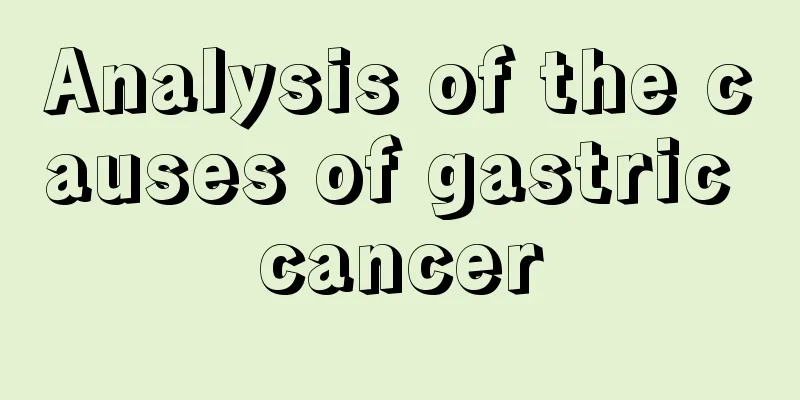Colorectal cancer affects physiological circulation

|
Colorectal cancer is one of the most common malignant tumors of the digestive tract. In developed Western countries, one in every 25 babies born will develop colorectal cancer in the future. In my country, the incidence of colorectal cancer has been increasing year by year over the past 20 years due to factors such as changes in dietary habits, and about 47,500 people die from colorectal cancer each year. What causes colorectal cancer? Studies have shown that factors such as diet, environment, genetics, and race are all related to the onset of colorectal cancer. Dietary factors and environmental factors are more important. Take Japan as an example. In the 1950s, Japan, like China, was a country with a low incidence of colorectal cancer. As the post-war economy recovered and developed, the incidence and mortality of colorectal cancer in Japan also increased. According to statistics from the Japanese Cancer Society, from 1947 to 1978, the mortality rate of colorectal cancer increased by about 2 times, while other cancers such as lung cancer only increased by 60%, and stomach cancer and cervical cancer decreased by 30% and 60% respectively. Analyzing the reasons, first, it is caused by the increase in fat diet and the decrease in fiber diet. The increase in the incidence of colorectal cancer in cities in my country in recent years is also related to the change in dietary structure. Second, the relationship between environment and colorectal cancer is very close. The main environmental factors are: selenium deficiency in the soil; the influence of schistosomiasis. In my country, areas with high incidence of schistosomiasis are also areas with high incidence of colorectal cancer; smoking easily causes colorectal cancer. Third, it is genetic factors. About 10% of colorectal cancer is related to genetic factors. Therefore, the offspring of patients diagnosed with familial colon polyposis, hereditary non-polyposis colorectal cancer and sporadic hereditary colorectal cancer should be closely tracked and followed up. At the same time, some benign tumors of the large intestine called polyps cannot be ignored. People who have suffered from ulcerative colitis for a long time also have a greater chance of developing colorectal cancer. In summary, people who meet any of the following conditions should be considered as high-risk groups for colorectal cancer: adults in areas with high incidence of colorectal cancer, such as large cities and southeastern coastal areas in my country; patients with colorectal adenoma, family members with multiple familial adenomatosis; patients who have previously suffered from colorectal cancer; patients with schistosomiasis; family members of colorectal cancer patients; members of cancer family syndrome; people who have received pelvic radiotherapy (some people report that pelvic radiotherapy makes them more likely to develop rectal cancer 10-20 years later); patients with chronic ulcerative colitis. Some people believe that people with this disease have a 10-fold higher chance of developing colorectal cancer than normal people. The following six symptoms of colorectal cancer should be identified by a doctor as soon as possible Blood in the stool: In the early stage of colorectal cancer, the lesions are limited to the mucosa, and there may be no symptoms, or only changes in bowel habits. When the tumor grows to a certain extent, blood in the stool may appear, and the blood is mostly light and dark, and adheres to the surface of the stool; Anemia and weight loss: As the disease progresses, patients may develop chronic wasting symptoms such as anemia, weight loss, fatigue and fever, often accompanied by fatigue and unexplained weight loss, which are related to bloody stools, insufficient intake and excessive consumption. Alternating diarrhea and constipation: If there are symptoms such as alternating diarrhea and constipation, it may be because the growth of the cancer affects the normal physiological function of the intestine, and the possibility of cancer should be considered; Abdominal pain and bloating: Colorectal cancer patients may experience abdominal bloating and pain due to intestinal obstruction, of which the incidence of abdominal pain is higher than that of bloating. The pain is mostly in the middle and lower abdomen, with varying degrees of severity, mostly dull pain or distending pain; Mucus and bloody stools: When a tumor ruptures, the stool often contains bright red or dark red blood and mucus, and the stool and blood are mixed; Changes in bowel habits: bowel movements change from once a day to two or three times a day, and there is a feeling of incomplete bowel movement after each bowel movement; If you have the above symptoms, it is best to undergo a colonoscopy, which is currently an effective means of early diagnosis of colorectal cancer. In addition, high-risk groups should be screened regularly. High-risk groups include those with a family history of colorectal cancer, adenocarcinoma polyps, long-term chronic colitis, and middle-aged and elderly people over 40 years old. |
<<: Does colorectal cancer cause anemia?
>>: What are the dangers of advanced colorectal cancer
Recommend
Effective folk remedies for treating pancreatic cancer
Effective folk remedies for treating pancreatic c...
Will my calves get thicker if I stand for a long time?
Long-term standing jobs generally require a certa...
What to do if external hemorrhoids bleed, how to treat it
External hemorrhoids are also a type of hemorrhoi...
What should you pay attention to in your diet during chemotherapy
Nowadays, the number of cancer patients is increa...
Do you know how to treat peripheral vision phobia?
Everyone may be unfamiliar with the term peripher...
How to distinguish platinum from silver
When buying gold and silver jewelry, it is necess...
Does stomach cancer cause bad breath?
Is bad breath harmful to human health? These issu...
What underwear should I wear if my breasts are sagging
Almost all women will experience the problem of s...
Does Eight Treasure Porridge nourish the stomach?
Eight Treasure Porridge is actually a very common...
Why do I feel cold but not fever?
If you feel cold but not feverish, you should pay...
What are the clinical manifestations of Kallmann syndrome?
Kallmann's syndrome is actually a form of hyp...
It feels like something is blocking my esophagus
The esophagus is an important passage in the uppe...
What is the best way to treat liver cancer
There are no obvious symptoms in the early stage ...
How to control the rapid growth of bone age?
In life, everyone knows that bone age is a sign o...
Will primary liver cancer be painful if it is 1cm? How to treat primary liver cancer
During the physical examination, the patient foun...









